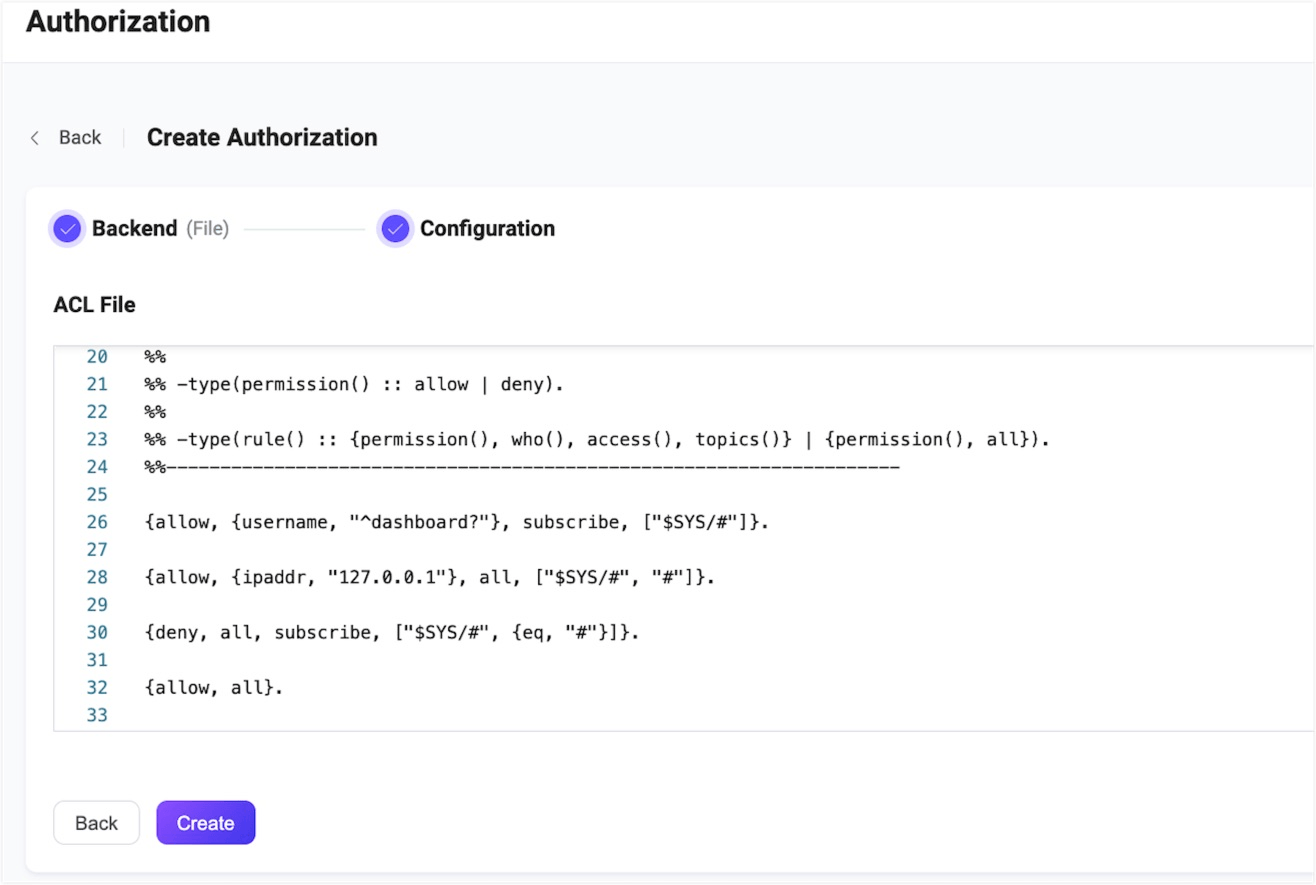Use ACL File
EMQX supports authorization checks against the predefined rules stored in ACL files. You can configure multiple authorization check rules in the file. After receiving the client's operation request, EMQX matches the authorization rules in order from top to bottom. After successfully matching a rule, EMQX allows or denies the current request according to the setting, and stops matching subsequent rules.
File-based ACL is simple and lightweight. It is suitable to configure generic rules. For hundreds or more per-client rules, it is recommended to use other authorization sources, and a file-based ACL can serve as a safety guard at the end of the authorization chain.
Prerequisite
Starting from 5.0, file-based ACL rules can be edited and reloaded from the EMQX Dashboard UI.
Be familiar with the basic concepts of Authorization.
ACL File Format
Before the authorization check based on the ACL file, you need to store the authorization rules in the file in the form of Erlang tuples data list.
The ACL configuration file is a list of Erlang tuples ending with a period. A tuple is a comma-separated list of expressions. The whole list is enclosed in curly braces.
The %% prefix identifies comment strings and will be abandoned in the parsing process.
Example:
%% Allow MQTT client using username "dashboard" to subscribe to "$SYS/#" topics
{allow, {user, "dashboard"}, subscribe, ["$SYS/#"]}.
%% Allow users with IP address "127.0.0.1" to publish/subscribe to topics "$SYS/#", "#"
{allow, {ipaddr, "127.0.0.1"}, all, ["$SYS/#", "#"]}.
%% Deny "All Users" subscribe to `$SYS/#`, `#` and `+/#`
{deny, all, subscribe, ["$SYS/#", {eq, "#"}, {eq, "+/#"}]}.
%% Allow any other publish/subscribe operation
%% NOTE: In production, change the last rule to `{deny, all}`, and set config: `authorization.no_match = deny`
{allow, all}.The rules are matched from top to bottom. If a rule matches, its permission is applied, and the remaining rules are ignored.
The first position in a tuple indicates the permission applied if the rule is successfully hit. The possible values are:
allowdeny
The second position of a tuple describes clients for whom the rule takes effect. The following terms and their combinations can be used to specify the clients:
{username, "dashboard"}: clients with user namedashboard; also can be{user, "dashboard"}{username, {re, "^dash"}}: clients with user name matching the regular expression^dash{clientid, "dashboard"}: clients with client IDdashboard; also can be{client, "dashboard"}{clientid, {re, "^dash"}}: clients with client ID matching the regular expression^dash{client_attr, "name", "dashboard"}: clients with client attributenameequal todashboard{client_attr, "name", {re, "^dash"}}: clients with client attributenamematching the regular expression^dash{ipaddr, "127.0.0.1"}: clients connecting from IP address127.0.0.1. Netmasks are allowed. If EMQX is behind a load balance,proxy_protocolshould be enabled for the client's MQTT listener.{ipaddrs, ["127.0.0.1", ..., ]}: clients connecting from one of the specified IP addresses127.0.0.1, ...,. Netmasks are allowed.all: any clients{'and', [Spec1, Spec2, ...]}: clients satisfying all of the specifications from the list{'or', [Spec1, Spec2, ...]}: clients satisfying any of the specifications from the list
The third position of the tuple indicates the operation to which the rule is applicable
publish: the rule applying to publish operationssubscribe: the rule applying to subscribe operationsall: the rule applying to both publish and subscribe operations- EMQX v5.1.1 and later support checking QoS and retained message flags in publish and subscribe operations. You can specify the QoS or retained message flag by adding
qosorretainto the third position, for example:{publish, [{qos, 1}, {retain, false}]}: deny publishing retained message with a QoS of 1{publish, {retain, true}}: deny publishing retained messages{subscribe, {qos, 2}}: deny subscribing to topics with QoS2
The fourth position of the tuple specifies the topics to which the rule applies. The topics are specified with a list op patterns. Topic placeholders can be used. The following patterns are available:
- A string value, like
"t/${clientid}": It uses topic placeholders. When a client with ID asemqx_ctriggers the authorization check, it matches the topict/emqx_cprecisely. - A string value, like
"$SYS/#": It is a standard topic filter allowing wildcards. Topic filters match topics according to the MQTT specification rules. For example,$SYS/#matches topics$SYS/foo,$SYS/foo/barfor publish and topics$SYS/foo,$SYS/foo/#, and$SYS/#for subscribe. Topic placeholders are also available. - An
eqtuple, like{eq, "foo/#"}: It indicates full equivalence of topic characters. This pattern matches exactlyfoo/#topic for all operations. Wildcards or placeholders are not taken into account, i.e., topicfoo/baris not matched.
- A string value, like
Additionally, there are two special rules. These rules are usually used as default at the end of the configuration.
{allow, all}: allow all operations.{deny, all}: deny all operations.
Configure with Dashboard
EMQX configures file-based authorizer by default. You can click Settings button in Actions column to view or edit the authorization rules configured in the ACL File area. For more information on file format and fields descriptions, see ACL file format.

Configure with Configuration File
The file-based authorizer is identified by type file.
Sample configuration:
authorization {
deny_action = ignore
no_match = deny
sources = [
{
type = file
enable = true
path = "etc/acl.conf"
}
]
}Where,
type: Data source types of authorizer; here isfile.enable: Whether to activate the authorizer; optional value:true,false.path: Configuration file path; default value:etc/acl.conf. If file-based authorizer is edited through Dashboard or REST API, EMQX stores the new file todata/authz/acl.confand stops reading the configuration in the original file.
TIP
The initial file provided by the path config is not mutable to EMQX. If rules are updated from the dashboard UI or management API, the new rules will be stored in data/authz/acl.conf, and this original config will no longer be loaded.
:::